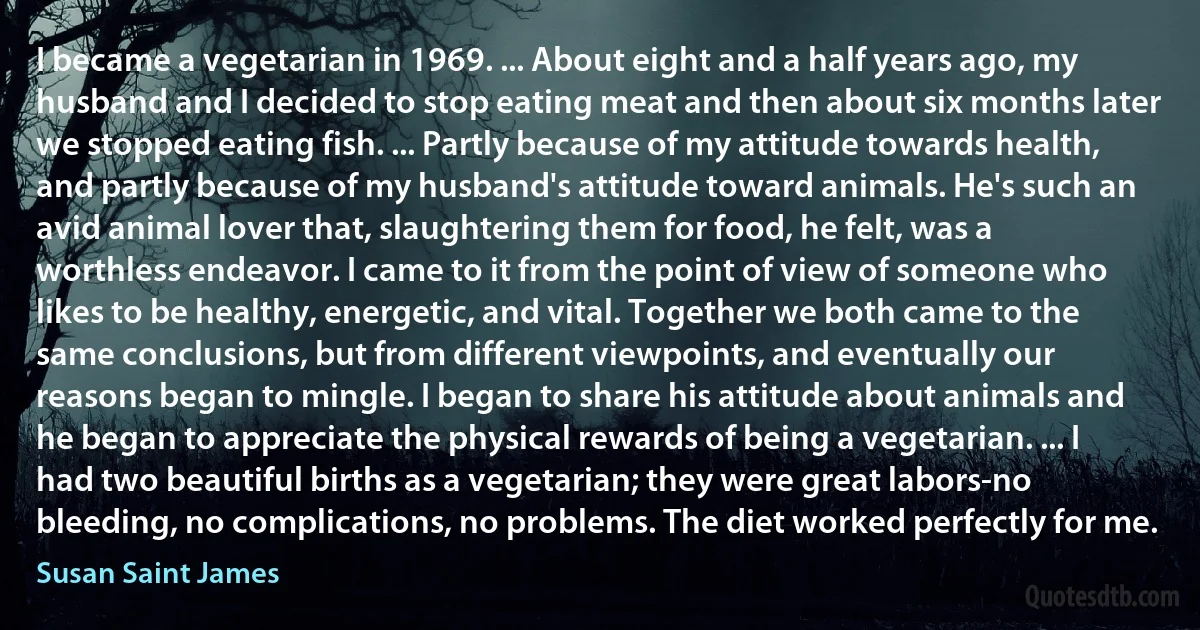
I became a vegetarian in 1969. ... About eight and a half years ago, my husband and I decided to stop eating meat and then about six months later we stopped eating fish. ... Partly because of my attitude towards health, and partly because of my husband's attitude toward animals. He's such an avid animal lover that, slaughtering them for food, he felt, was a worthless endeavor. I came to it from the point of view of someone who likes to be healthy, energetic, and vital. Together we both came to the same conclusions, but from different viewpoints, and eventually our reasons began to mingle. I began to share his attitude about animals and he began to appreciate the physical rewards of being a vegetarian. ... I had two beautiful births as a vegetarian; they were great labors-no bleeding, no complications, no problems. The diet worked perfectly for me.
Susan Saint JamesRelated topics
animal beautiful begin came diet different eating eight energetic felt fish food great half health husband later lover meat mingle point share six slaughtering stop view vital someone years monthsRelated quotes
the most remarkable piece of reading that you may be recommended to take and try if you can study is a book by Goethe-one of his last books, which he wrote when he was an old man, about seventy years of age-I think one of the most beautiful he ever wrote, full of mild wisdom, and which is found to be very touching by those who have eyes to discern and hearts to feel it. It is one of the pieces in "Wilhelm Meister's Travels." I read it through many years ago; and, of course, I had to read into it very hard when I was translating it (applause), and it has always dwelt in my mind as about the most remarkable bit of writing that I have known to be executed in these late centuries. I have often said, there are ten pages of that which, if ambition had been my only rule, I would rather have written than have written all the books that have appeared since I came into the world.

Thomas Carlyle
Rawls resorted to Hegel in his internal reflections on a constitutional state. On the plane of inter-state relations, Kant remained his philosopher of reference, as the theorist of conditions for a perpetual peace. So too for Habermas. But since Kant failed to envisage the necessary legal framework for a cosmopolitan order, as it started to take shape through the permanent institutions of the United Nations, Habermas, when he came to review the progress made since 1945, also looked towards the philosopher of objective idealism. Measured against the sombre background of the disasters of the first half of the twentieth century, he decided, ‘the World Spirit, as Hegel would have put it, has lurched forward'. As we have seen, Bobbio was responsible for the most pointed appeal to Hegel of all. In one sense, he was more entitled to do so.

Perry Anderson
The last six years afforded me much time and food for thought. I came to the conclusion that the human race is not divided into two opposing camps of good and evil. It is made up of those who are capable of learning and those who are incapable of doing so. Here I am not talking of learning in the narrow sense of acquiring an academic education, but of learning as the process of absorbing those lessons of life that enable us to increase peace and happiness in our world. Women in their role as mothers have traditionally assumed the responsibility of teaching children values that will guide them throughout their lives. It is time we were given the full opportunity to use our natural teaching skills to contribute towards building a modern world that can withstand the tremendous challenges of the technological revolution which has in turn brought revolutionary changes in social values.

Aung San Suu Kyi
For what advantage is it, that the world enjoys profound peace, if thou art at war with thyself? This then is the peace we should keep. If we have it, nothing from without will be able to harm us. And to this end the public peace contributes no little: whence it is said, ‘That we may lead a quiet and peaceable life.' But if any one is disturbed when there is quiet, he is a miserable creature. Seest thou that He speaks of this peace which I call the third (inner, ed.) kind? Therefore when he has said, ‘that we may lead a quiet and peaceable life,' he does not stop there, but adds ‘in all godliness and honesty.' But we cannot live in godliness and honesty, unless that peace be established. For when curious reasonings disturb our faith, what peace is there? or when spirits of uncleanness, what peace is there?

John Chrysostom
If Christ were to walk in this world today, do you know what would happen to Him? He would be placed in a mental institution and given psycho-therapy, just as would His Saints. The world would crucify Him today just as it did 2000 years ago, for the world has not learned a thing, except more devious forms of hypocrisy. And what would happen if, in one of my classes at the university, I would one day tell my students that all the learning of this world is of no importance beside the duty of worshipping God, accepting the God-man who died for our sins, and preparing for the life of the world to come? They would probably laugh at me, and the university officials, if they found out, would fire me-for it is against the law to preach the Truth in our universities. We say that we live in a Christian society, but we do not: we live in a society.

Seraphim Rose
